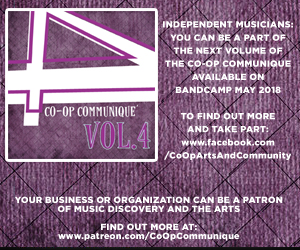The Co-Op Communique: Who We Are and What We Do
The statement is the most frustrating one there is for anyone who writes about music creates music or is a committed fan of music: there’s no good music anymore.
The truth is that there’s plenty of good music, new music from brand-new artists, out there, but it’s harder to find. In fact, at no other time has there been so much new music waiting to be found, but you have to do a lot of work to find them.
Why is that? I’m not going to demonize the “Music Industry.” It is the easiest target with the bully pulpit of market share. We know that should Beyonce decide to put out a surprise track today, its existence will suck all the oxygen out of every other music-related conversation taking place in the larger media landscape. Still, it goes deeper than that.
Music fans are more siloed and separated than ever before, sometimes by choice but mostly by chance. When is the last time a peer suggested a new artist to you and you listened? Odds are, not recently because we don’t necessarily have those sorts of conversations anymore. Life is so complicated, much more complicated than when we were in our teens and twenties and our identities were frequently and intrinsically tied to music. Occasionally something new gets through, but I’ll bet this doesn’t happen too often.
There are cost hurdles on both sides that further complicate the matter. Most artists do not have the financial ability to – let’s be frank about this – shove their new product down your throat. Most consumers can get everything, or almost everything, as a free stream, and streaming services are not particularly friendly to throwing new concepts at the listener. You’ll get your playlist, but everything on there will be determined by a mandate to keep you on that list. Free plays are paid with advertising, so no curve balls, please.
That’s why fun playlists are, sadly, never challenging (or peppered with surprises).
The artists cannot pay. The audience has grown used to not paying. These are complicated parameters to navigate. In 2015, I made a decision to do something about this. While the Internet has made music marketing harder in some ways, it’s made it easier in others. Working in conjunction with Bandcamp.com, I was able to gather a great team of people together to help with an idea I had.
“Gather” is such a definitive statement, and misleading. I mentioned what I intended to do and people I communicated with jumped in and ran. The Co-Op Communique came together thanks to the will and support of folks like Matt Crosslin, editor of the Down The Line webzine; Mike Indest, host of the Down The Line Basement Tapes podcast; Craig Ellis Bacon, editor of the Radio Eclectic webzine; Dan Pavelich, from the Vandelay Records label; Ray Gianchetti from Kool Kat Records; Keith Klingensmith from Futureman Records; Matthew Rowe from MusicTAP; Gary Wien from New Jersey Stage; Lazlo from BlowUpRadio.com; and the list goes on (my apologies if I missed you).
But what were they signing on to? Here’s how it works. I try to gather as many artists as possible on our annual compilation with the intent to expose one artist’s fans to other artists’ music and expose their fans to others. It is a “rising tide lifts all boats” kind of approach. There are other compilations out there of this sort, but most charge people to buy/download the collection, and also charge the artists to be placed in the collection.
We don’t do either. Charging the audience dissuades them from trying it, which in turn destroys the main goal of introducing new music to them. At the same time, the usage of an artist’s song on the compilation is rather a sacrifice for the artist already. It’s not right to then ask them for money to be a part of it, so we don’t do that. Their contribution is their “pay in,” as it were.
That’s The Co-Op Communique. It’s our way of fostering that peer-organized conversation we all used to have. The listener can either stream or download the collection for free and then easily find those other new artists that grab them. We place their website addresses, Bandcamp pages, Facebook page URLs, etc., right in their song profile.
What we ask artists for:
• A WAV of your most “crowd-pleasing” song, something you feel would draw listeners to a larger body of work
• Listing of writers/performers on the track
• Publishing company name associated with the song (if any)
• Royalties association connected with the song (if any)
• Most importantly, links where listeners can follow to find more – your website or Facebook page, Reverbnation page, Bandcamp page, etc.
Learn more about Co-Op at our Facebook page: https://www.facebook.com/CoOpArtsAndCommunity/
Once you’re a part of Co-Op, we’ll continue to support you, year after year. Check out previous editions of the Co-Op Communique and follow up with these artists today:
https://coopcommunique.bandcamp.com/album/the-co-op-communique-volume-two
https://coopcommunique.bandcamp.com/album/the-co-op-communique-volume-three
https://coopcommunique.bandcamp.com/album/loves-labours-loosed-a-co-op-communique-flash-compilation
We have established a Patreon campaign for Co-Op. We’re searching for other organizations to play an important role, keeping the compilation free the artists to participate and for the audience to experience. As the executive behind Co-Op, I want to keep things free for both the artists and downloaders and that is our operating mission.
If you’re not an artist but want to support our efforts, or you are involved with a business or organization that would like to take advantage of sponsor opportunities as a patron of Co-Op, you can make a real difference today at: https://www.patreon.com/CoOpCommunique
